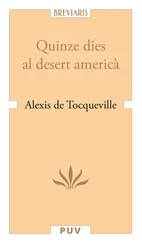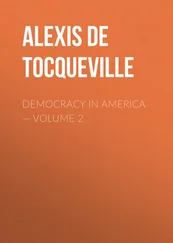Alexis de Tocqueville - American Institutions and Their Influence
Здесь есть возможность читать онлайн «Alexis de Tocqueville - American Institutions and Their Influence» — ознакомительный отрывок электронной книги совершенно бесплатно, а после прочтения отрывка купить полную версию. В некоторых случаях можно слушать аудио, скачать через торрент в формате fb2 и присутствует краткое содержание. Жанр: foreign_antique, Политика, foreign_edu, на английском языке. Описание произведения, (предисловие) а так же отзывы посетителей доступны на портале библиотеки ЛибКат.
- Название:American Institutions and Their Influence
- Автор:
- Жанр:
- Год:неизвестен
- ISBN:нет данных
- Рейтинг книги:5 / 5. Голосов: 1
-
Избранное:Добавить в избранное
- Отзывы:
-
Ваша оценка:
- 100
- 1
- 2
- 3
- 4
- 5
American Institutions and Their Influence: краткое содержание, описание и аннотация
Предлагаем к чтению аннотацию, описание, краткое содержание или предисловие (зависит от того, что написал сам автор книги «American Institutions and Their Influence»). Если вы не нашли необходимую информацию о книге — напишите в комментариях, мы постараемся отыскать её.
American Institutions and Their Influence — читать онлайн ознакомительный отрывок
Ниже представлен текст книги, разбитый по страницам. Система сохранения места последней прочитанной страницы, позволяет с удобством читать онлайн бесплатно книгу «American Institutions and Their Influence», без необходимости каждый раз заново искать на чём Вы остановились. Поставьте закладку, и сможете в любой момент перейти на страницу, на которой закончили чтение.
Интервал:
Закладка:
America is the only country in which it has been possible to study the natural and tranquil growth of society, and where the influence exercised on the future condition of states by their origin is clearly distinguishable.
At the period when the people of Europe landed in the New World, their national characteristics were already completely formed; each of them had a physiognomy of its own; and as they had already attained that stage of civilisation at which men are led to study themselves, they have transmitted to us a faithful picture of their opinions, their manners, and their laws. The men of the sixteenth century are almost as well known to us as our contemporaries. America consequently exhibits in the broad light of day the phenomena which the ignorance or rudeness of earlier ages conceals from our researches. Near enough to the time when the states of America were founded to be accurately acquainted with their elements, and sufficiently removed from that period to judge of some of their results. The men of our own day seem destined to see farther than their predecessors into the series of human events. Providence has given us a torch which our forefathers did not possess, and has allowed us to discern fundamental causes in the history of the world which the obscurity of the past concealed from them.
If we carefully examine the social and political state of America, after having studied its history, we shall remain perfectly convinced that not an opinion, not a custom, not a law, I may even say not an event, is upon record which the origin of that people will not explain. The readers of this book will find the germe of all that is to follow in the present chapter, and the key to almost the whole work.
The emigrants who came at different periods to occupy the territory now covered by the American Union, differed from each other in many respects; their aim was not the same, and they governed themselves on different principles.
These men had, however, certain features in common, and they were all placed in an analogous situation. The tie of language is perhaps the strongest and most durable that can unite mankind. All the emigrants spoke the same tongue; they were all offsets from the same people. Born in a country which had been agitated for centuries by the struggles of faction, and in which all parties had been obliged in their turn to place themselves under the protection of the laws, their political education had been perfected in this rude school, and they were more conversant with the notions of right, and the principles of true freedom, than the greater part of their European contemporaries. At the period of the first emigrations, the parish system, that fruitful germe of free institutions, was deeply rooted in the habits of the English; and with it the doctrine of the sovereignty of the people had been introduced even into the bosom of the monarchy of the house of Tudor.
The religious quarrels which have agitated the Christian world were then rife. England had plunged into the new order of things with headlong vehemence. The character of its inhabitants, which had always been sedate and reflecting, became argumentative and austere. General information had been increased by intellectual debate, and the mind had received a deeper cultivation. While religion was the topic of discussion, the morals of the people were reformed. All these national features are more or less discoverable in the physiognomy of those adventurers who came to seek a new home on the opposite shores of the Atlantic.
Another remark, to which we shall hereafter have occasion to recur, is applicable not only to the English, but to the French, the Spaniards, and all the Europeans who successively established themselves in the New World. All these European colonies contained the elements, if not the development of a complete democracy. Two causes led to this result. It may safely be advanced, that on leaving the mother-country the emigrants had in general no notion of superiority over one another. The happy and the powerful do not go into exile, and there are no surer guarantees of equality among men than poverty and misfortune. It happened, however, on several occasions that persons of rank were driven to America by political and religious quarrels. Laws were made to establish a gradation of ranks; but it was soon found that the soil of America was entirely opposed to a territorial aristocracy. To bring that refractory land into cultivation, the constant and interested exertions of the owner himself were necessary; and when the ground was prepared, its produce was found to be insufficient to enrich a master and a farmer at the same time. The land was then naturally broken up into small portions, which the proprietor cultivated for himself. Land is the basis of an aristocracy, which clings to the soil that supports it; for it is not by privileges alone, nor by birth, but by landed property handed down from generation to generation, that an aristocracy is constituted. A nation may present immense fortunes and extreme wretchedness; but unless those fortunes are territorial, there is no aristocracy, but simply the class of the rich and that of the poor.
All the British colonies had then a great degree of similarity at the epoch of their settlement. All of them, from their first beginning, seemed destined to behold the growth, not of the aristocratic liberty of their mother-country, but of that freedom of the middle and lower orders of which the history of the world has as yet furnished no complete example.
In this general uniformity several striking differences were however discernible, which it is necessary to point out. Two branches may be distinguished in the Anglo-American family, which have hitherto grown up without entirely commingling; the one in the south, the other in the north.
Virginia received the first English colony; the emigrants took possession of it in 1607. The idea that mines of gold and silver are the sources of national wealth, was at that time singularly prevalent in Europe; a fatal delusion, which has done more to impoverish the nations which adopted it, and has cost more lives in America, than the united influence of war and bad laws. The men sent to Virginia 14 14 The charter granted by the crown of England, in 1609, stipulated, among other conditions, that the adventurers should pay to the crown a fifth of the produce of all gold and silver mines. See Marshall's "Life of Washington," vol i., pp. 18-66.
were seekers of gold, adventurers without resources and without character, whose turbulent and restless spirits endangered the infant colony, 15 15 A large portion of the adventurers, says Stith (History of Virginia), were unprincipled young men of family, whom their parents were glad to ship off, discharged servants, fraudulent bankrupts, or debauchees: and others of the same class, people more apt to pillage and destroy than to assist the settlement, were the seditious chiefs who easily led this band into every kind of extravagance and excess. See for the history of Virginia the following works:— "History of Virginia, from the first Settlements in the year 1624," by Smith. "History of Virginia," by William Stith. "History of Virginia, from the earliest Period," by Beverley.
and rendered its progress uncertain. The artisans and agriculturists arrived afterward; and although they were a more moral and orderly race of men, they were in nowise above the level of the inferior classes in England. 16 16 It was not till some time later that a certain number of rich English capitalists came to fix themselves in the colony.
No lofty conceptions, no intellectual system directed the foundation of these new settlements. The colony was scarcely established when slavery was introduced, 17 17 Slavery was introduced about the year 1620, by a Dutch vessel, which landed twenty negroes on the banks of the river James. See Chalmer.
and this was the main circumstance which has exercised so prodigious an influence on the character, the laws, and all the future prospects of the south.
Интервал:
Закладка:
Похожие книги на «American Institutions and Their Influence»
Представляем Вашему вниманию похожие книги на «American Institutions and Their Influence» списком для выбора. Мы отобрали схожую по названию и смыслу литературу в надежде предоставить читателям больше вариантов отыскать новые, интересные, ещё непрочитанные произведения.
Обсуждение, отзывы о книге «American Institutions and Their Influence» и просто собственные мнения читателей. Оставьте ваши комментарии, напишите, что Вы думаете о произведении, его смысле или главных героях. Укажите что конкретно понравилось, а что нет, и почему Вы так считаете.












